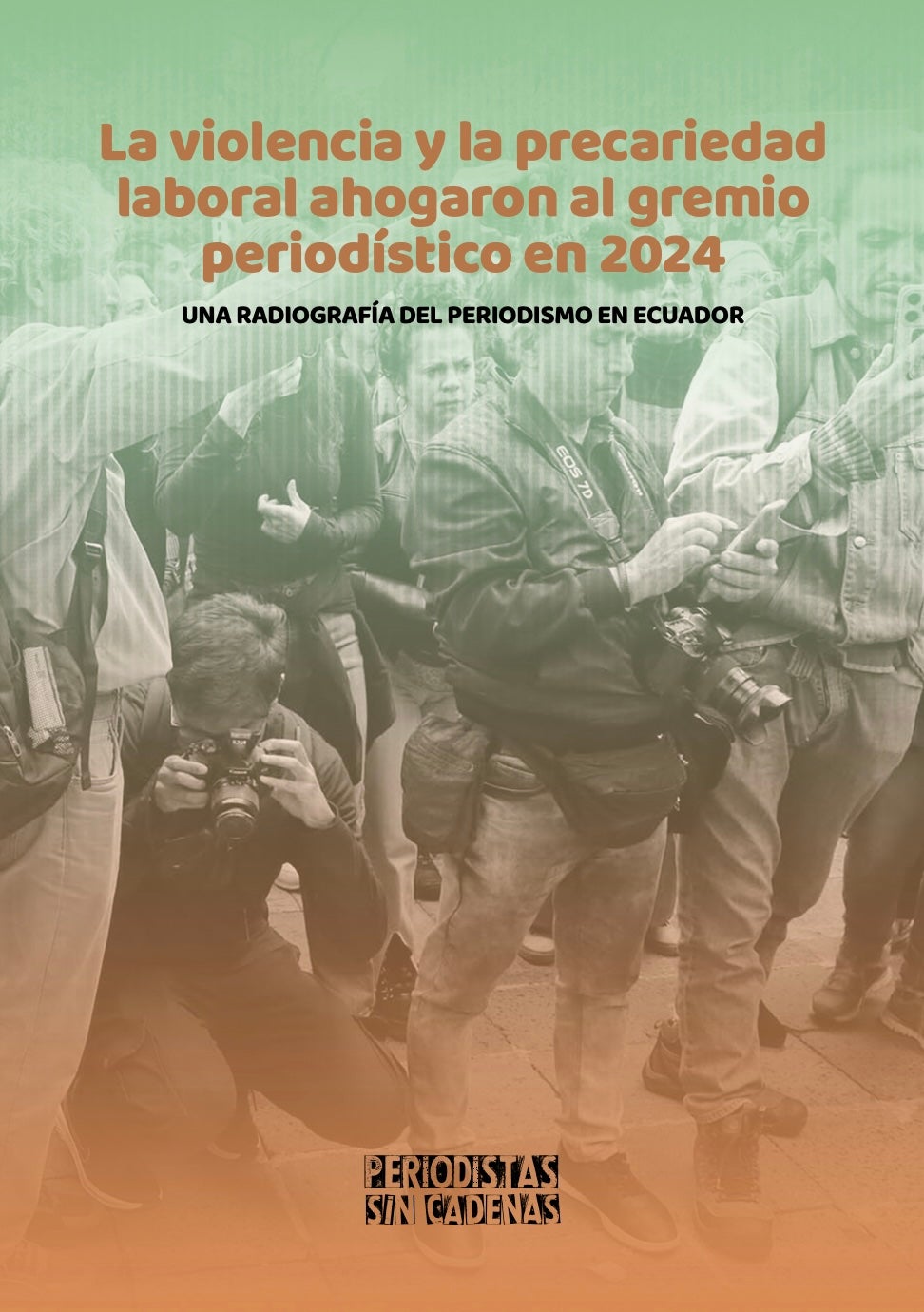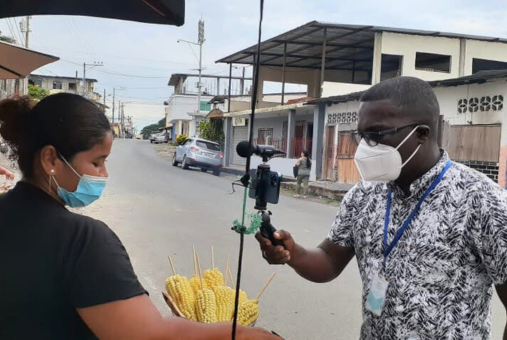Journalist Luis Cheme, based in the province of Esmeraldas on Ecuador’s northern border, is a correspondent for a national media group.
He used to be a full-time employee but is now paid by story and has no legal benefits.
“As correspondents, the agreement from the beginning was that we would work under the billing system,” Cheme told LatAm Journalism Review (LJR). “There's no employment relationship, no legal benefits, no travel expenses, nothing. You earn what you produce, and that's it.”
In much of Ecuador, journalism is practiced under precarious working conditions, with low wages, no legal benefits and in many cases no social security.

Job insecurity was the second most threatening factor for Ecuadorian journalism in 2024, according to a report by the Periodistas Sin Cadenas foundation. (Photo: Screenshot)
In fact, job insecurity was identified by journalists as the second biggest threat to the profession in Ecuador in 2024, according to a new report from Fundación Periodistas Sin Cadenas. It ranked only after violence, in a country that has the region’s highest homicide rate.
"We were sadly surprised to find there are journalists who are paid between one and five dollars for a story," Susana Morán from Periodistas Sin Cadenas, told LJR. "They are working mostly informally, without access to social security."
Almost 40 percent of media workers surveyed by the foundation said they earn less than $400 a month, below the country's minimum wage of $470 a month.
Cheme receives more than these minimums because he aims to publish more than one article a day and writes special reports for the weekend editions. He makes his articles as comprehensive as possible, preferably with photographs and covering current issues, so they can be published on the front page or as a double-page spread inside. These, he said, pay a higher rate.
In recent years, he said he’s seen colleagues who worked as media employees fired or forced to resign, only to be rehired as fee-based service providers without legal benefits. Many of them, he said, have no fixed income or do not earn the minimum wage.
“Journalists have to continue doing something to be able to eat and have accepted conditions that are unworthy of their profession,” Morán said, regarding journalists who continue without security or protections.
Precariousness is nothing new for Ecuadoran journalism. Morán said it's a structural problem tied to the country's overall conditions. But the situation worsened after the COVID-19 pandemic, when nearly 23,000 communications workers in Ecuador were laid off and dozens of regional media outlets were forced to close, according to prior research from Periodistas Sin Cadenas.
"Many of these journalists who were fired or whose media outlets disappeared were left without receiving their legal rights as workers,” Morán said. “These include severance pay or even unpaid wages that went unpaid for a long time.”
Morán said the labor rights crisis affecting Ecuador has also been a factor in worsening the working conditions of journalists.

A reporter interviews a street vendor in a town in Ecuador. Due to precarious labor conditions, Ecuadorian journalists are limited to covering daily news stories. (Photo: Courtesy of Periodismo Sin Cadenas).
The report by Periodistas Sin Cadenas mentions the case of El Comercio, one of Ecuador's oldest and most popular newspapers, which as of 2024 still owed back wages to former employees and retirees.
Medium-sized and large media outlets that had the capacity to attract younger journalists to begin their careers are increasingly fewer, Morán said, either because they have disappeared or because their hiring conditions have changed to ones without employment relationships or legal benefits.
Job insecurity and violence are also forcing journalists to leave their homes. Almost 12 percent of the media workers surveyed by Periodistas Sin Cadenas said they had to move cities in the last two years. Half of those respondents made the decision for economic reasons.
Total or partial abandonment of the profession is another consequence of job insecurity. Forty-four percent of respondents said they have been forced to stop working as a journalist due to issues of economics or insecurity in 2023 and 2024.
The report said that job insecurity is also limiting the development of investigative journalism in Ecuador, as it is expensive. Therefore, media outlets are limited to covering daily news stories without delving into the facts.
Journalist Manuel Moreira has seen job insecurity among colleagues in the coastal city of Manta in western Ecuador.
"There are radio announcers who, for example, earn $200 a month, others $50, and still others have no salaries and make a living off their digital ventures," Moreira told LJR regarding the state of journalism in Manabí, the province where Manta is located. "It's a very, very precarious situation."

In the province of Manabí, a group of journalists offer paid commercial videos on Facebook Live to local businessmen. (Photo: Screenshot)
Moreira divides his own work schedule between his journalistic venture, the Facebook-based news outlet InforManta, and two other jobs: one full-time as a reporter for another digital outlet and another part-time as an editor at a community radio station.
A little over a year ago, he had an idea to better leverage the reach of his site. Moreira and a group of about 10 colleagues organized a project to offer local entrepreneurs commercial coverage through live broadcasts on Facebook.
“When someone, for example, wants advertising work done for the opening of a condominium, or if someone is opening a hotel, a pizzeria, or a hair salon, they contact us, and we all go and get it done,” Moreira said. “We work as a sort of communications agency.”
Moreira said that in Manabí, live broadcasts on social media have a significant impact, which is why each media outlet charges entrepreneurs between $20 and $60 to broadcast their events or businesses live. For him, he said, this money is extra income that he uses primarily to pay for fuel. But for some of his colleagues, these videos represent their only income.
“My reality is very different from that of my colleagues because they don't have a fixed salary, and I do, sometimes it comes late, but I do. But they depend entirely on this type of business,” he said. “With $30, they can buy meat for a week. With another $20, they can buy vegetables and fruit for a week.”